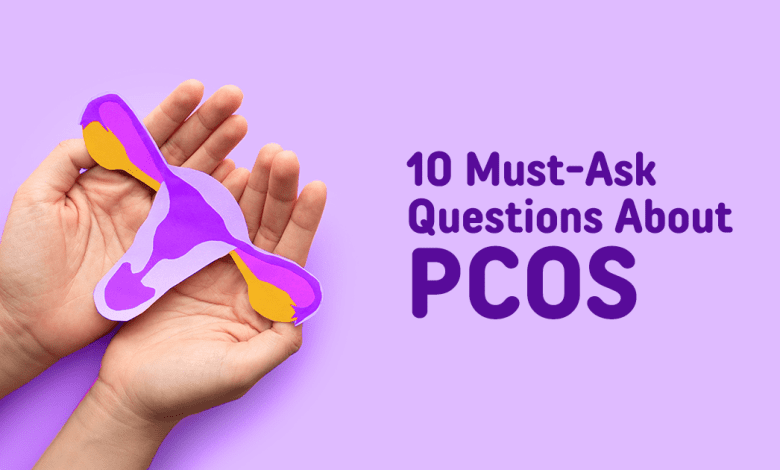10 Must-Ask Questions About PCOS

Polycystic ovary syndrome (PCOS) is a hormonal problem that happens during the reproductive years. The condition causes irregular periods along with hormonal imbalances. Luckily, PCOS can be diagnosed and treated effectively to restore fertility in women. A fertility specialist can find out the underlying issue behind PCOS and offer treatment accordingly.
Remember to ask these 10 important questions during your visit to the doctor!
Q-1: What is PCOS?
Ans: The most common endocrine disorder in women is polycystic ovary syndrome (PCOS). Although the actual cause of PCOS is unknown, we do know that it frequently results in a hormonal imbalance in the body. Women with PCOS can have elevated levels of androgens like testosterone. It can have many effects throughout your body such as irregular menstrual cycles and increased hair growth and acne.
Q-2: What are the symptoms of PCOS?
Ans: PCOS is a syndrome that affects every woman differently. Women suffering from PCOS may not experience the same symptoms. Some may encounter only a few while others may encounter more. During your visit to the fertility specialist do enquire about the symptoms associated with PCOS. Besides, here are some of the most common symptoms of polycystic ovary syndrome:
- Missed, irregular, or very light periods
- Large ovaries
- Body hair on the chest, stomach, and back (hirsutism)
- Weight gain, particularly around the midsection (abdomen)
- Acne or acne-prone skin
- Male pattern baldness or hair thinning
- Infertility
- Patches of dark or thick skin on the back of the neck, armpits, and under the breasts
Q-3: What causes PCOS in women?
Ans: The exact cause of PCOS remains unknown but certain factors can lead up to PCOS in women. Women may develop PCOS if it runs in their families. Genes can be one of the reasons behind it. Insulin is a hormone generated by the pancreas to help the body use sugar from diet as energy. When cells are unable to use insulin properly, the body’s demand for insulin grows. The pancreas creates extra insulin to compensate. Extra insulin causes the ovaries to produce more male hormones. Another probable cause for polycystic ovary syndrome.
Q-4: How is PCOS diagnosed?
Ans: Because PCOS symptoms vary, it is difficult to diagnose the disorder using a single method. To diagnose PCOS in women, the fertility specialist may perform one or a combination of tests. Before making a diagnosis, the doctor may ask you a few questions about your medical history and symptoms to have a better understanding. Blood tests can determine androgen and other hormone levels. The fertility specialist may also test insulin, thyroid, prolactin, and other hormones. Ultrasound is another test that uses sound waves to generate images of tissues, organs and blood vessels. By using this method the size of ovaries and the presence of cysts in them can be known.
Q-5: How does PCOS affect fertility?
Ans: PCOS impairs fertility by interfering with ovulation. Women with PCOS frequently have elevated amounts of androgens, such as testosterone, which can result in irregular or non-existent menstrual cycles. If you have irregular menstrual periods or no menstrual cycles, this indicates that you are not ovulating frequently or at all. Ovulation is must to become pregnant. Even minor weight loss can help restore normal periods and ovulation. Medication can also be used to stimulate ovulation.
Q-6: Does PCOS affect general health?
A: Sadly, PCOS not only affects fertility but general health too. Therefore, asking the doctor about potential negative effects on health will help you evaluate the situation. Women who have PCOS are more likely to develop obesity, insulin resistance, diabetes, high blood pressure, high cholesterol, heart disease, and uterine cancer. It is vital that you communicate with your fertility doctor and ask these questions. The doctor may recommend screenings to determine if you are at risk of these diseases. Screening tests aid in the early detection of problems, when they are easiest to treat!
Q-7: Can I do anything to decrease my PCOS symptoms?
Ans: Luckily the symptoms of PCOS can be reduced by making certain lifestyle changes. These modifications can have a major impact on health and can help battle PCOS symptoms. Diet and exercise are a part of these changes as they will enable you to restore evaluation. You can improve the intake of vitamin D and calcium, as it helps to maintain a healthy BMI and improves menstrual abnormalities. Other nutrients such as Magnesium, chromium and Omega-3 are also essential to boost fertility. You should consult the doctor on the weight loss plan if you are overweight. Generally, following a diet and regular exercise can help you lose weight.
Q-8: What diet is best for women with PCOS?
Ans: polycystic ovary syndrome can have an impact on how your body uses glucose (sugar), which is our body’s major source of energy. This has an effect on your insulin levels, which can lead to insulin resistance and raises the chance of getting diabetes. Diet is one of the most effective methods to combat these changes. Eating a low-carb diet and focusing on good carbs is important. Whole grains and fruit, for example. Instead of sweet goodies, choose berries that are high in antioxidants. Limit the intake of sugary beverages. Increase the intake of vegetables and protein, particularly lean meats like fish, and chicken. Eating more unsaturated vegetable oils, such as walnuts and avocado, is also beneficial to long-term health. The diet works best when suggested by the doctor, so don’t forget to seek your healthcare expert’s help.
Q-9: If I have PCOS, should I see a fertility doctor before trying to conceive?
Ans: If you are suffering from PCOS then it means that naturally conceiving will be unlikely. Being diagnosed with PCOS is tough news to bear when you are hoping to experience the joy of being a parent. so. if you are already diagnosed with polycystic ovary syndrome then visiting a fertility doctor is a good idea. The expert will be able to assist you with the treatment to achieve pregnancy. In many cases, just a lifestyle change will improve the chances of conceiving without seeking any treatment.
Q-10: Can IVF help women with PCOS get pregnant?
Ans: In vitro fertilization (IVF) is one of the most advanced fertility treatments that is a blessing for a couple suffering from infertility. IVF is used in an array of cases to increase the chances of fertility. Fortunately, IVF has a high success rate with polycystic ovary syndrome and also supports natural pregnancy. Consulting an IVF specialist regarding the treatment will help you understand it better.
These were the questions related to polycystic ovary syndrome that you must ask your fertility doctor. If you or your partner are suffering from PCOS then visiting a fertility specialist will help you battle the issue. Banker IVF is an IVF centre in Ahmedabad that provides high-end fertility treatments for multiple ailments. Dr. Manish Banker and his expert team will assist you with fertility counseling to treatment procedures. So, you may cherish the joy of being a parent!





